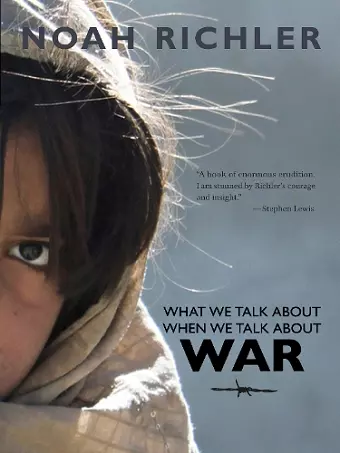What We Talk About When We Talk About War
Format:Paperback
Publisher:Goose Lane Editions
Published:20th Apr '12
Should be back in stock very soon

An Amazon.ca Editor's Pick for 2012 and a Globe and Mail Top 100 Book of 2012
Shortlisted, Governor General's Award for Non-Fiction, Shaughnessy Cohen Prize for Political Writing, and John W. Dafoe Book Prize
Longlisted, Charles Taylor Prize for Literary Non-Fiction
A provocative examination of how communications has shaped the language of the media, and vice versa, and how rhetoric shapes how Canadians thinks of themselves as a nation and Canada's engagement in peacekeeping, war, and on the international stage.
According to Richler, each phase of engagement in Afghanistan has been shaped not only by rhetoric but an overarching narrative structure. This topic is very much in discussion at the moment. With the withdrawal of Canadian troops (at least in part) from Afghanistan, it becomes clear there had been a rhetorical cycle. Where once Canada wielded the myth of itself as a peacekeeping nation, the past decade has seen a marked shift away from this, emphasizing the Canadian soldier as warrior. Yet now, as the country withdraws, the oratorical language we use steps away from heroes, able warriors, and sacrifice and back towards a more comfortable vision of Canada in a peacekeeping/training role.
In recent years, Canada has made large financial investments in the apparatus of war — in a manner it hasn't in a very long time — and as the realities of war are brought home (the losses, the tragedies, the atrocities, the lasting repercussions that come home with the soldiers who were on the front lines), Richler contends that it's crucial we understand our national perspective on war — how we have framed it, how we continue to frame it.
Using recent events to bolster his arguments, including the shooting of American congresswoman Gabrielle Giffords and the earthquake in Haiti, Richler argues that very possibly the epic narrative of Canada is winding back down to that of the novel as we slowly regain our peacekeeping agenda.
"Anyone looking for an argument about something important would be well served to pick up What We Talk About When We Talk About War, Richler's provocative and ambitious new book." -- Randy Boyagoda * National Post *
"What We Talk About When We Talk About War is an eloquent meditation on the nature of modern warfare, and one of the best books I've read about Canada in years — not the surprisingly colourful, forgotten history of, but a biting analysis of who we are in the twenty-first century. and why. ... So we are living in epic times. By identifying a sea change in the Canadian political psyche, Noah Richler identifies the spirit of our times, opens an important discussion. ... Don't leave this one to the critics. Buy the book, sink back, get mad and enjoy." * roverarts.com *
"A hard-hitting polemic aimed at the new 'philistines' laying siege to Lester B. Pearson's legacy of liberal internationalism and peacekeeping ... Richler's War catapults him to the front line of the ongoing Canadian culture war. He brings to the task the unique talents and perceptions of a novelist. It's rare to find in Canadian political discourse precise references to Homer's The Iliad and the Trojan War." * Chronicle Herald *
"Richler argues that the Canadian public has not been all that supportive or interested in the war in Afghanistan. He offers proof in the huge outpouring of sympathy and aid to Haiti. ... a great book for the peace movement to use. ... What We Talk About When We Talk About War lays the ground for what we must be talking about when we talk about peace." -- Shirley Farlinger * scienceforpeace.ca *
- Joint winner of Globe & Mail Top 100 Books of 2012 2012 (Canada)
- Joint winner of Amazon.ca Editor's Pick for 2012 2012 (Canada)
- Short-listed for Governor General's Award for Non-Fiction 2012 (Canada)
- Short-listed for Shaughnessy Cohen Prize for Political Writing 2013 (Canada)
- Short-listed for John W. Dafoe Book Prize 2013 (Canada)
ISBN: 9780864926227
Dimensions: 203mm x 152mm x 23mm
Weight: 480g
376 pages
First